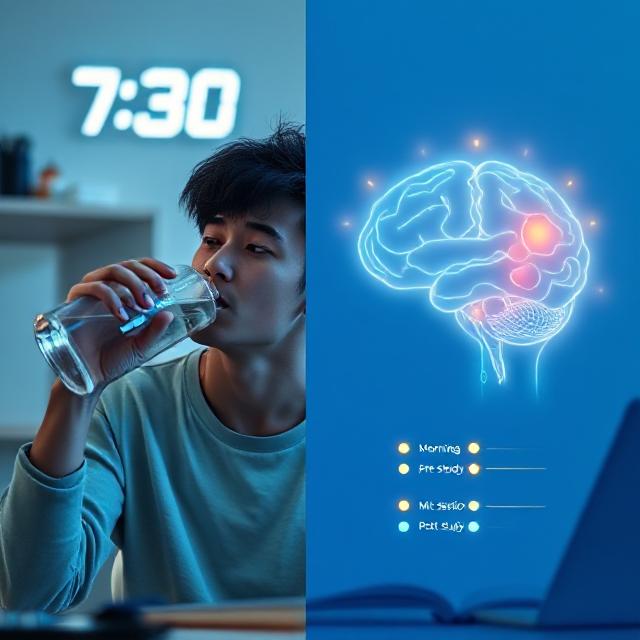
Table of Contents
Smart Sipping: Timed Hydration for Study
Water fuels more than your body—it’s essential for your brain’s electrical balance, nutrient delivery, and overall cognitive sharpness. But when and how you hydrate can matter even more than how much you drink. Welcome to the science of timed hydration, a subtle yet powerful way to enhance your study performance.
Most people think of hydration as a passive act—“just drink when thirsty.” But brain-optimized hydration is proactive. By synchronizing your sipping patterns with your brain’s natural rhythms, you can boost focus, memory, and alertness during study sessions—without crashing or over-drinking.
Let’s decode the art of “smart sipping” and how to hydrate at the right time, in the right way, to maximize your mental performance.
🧠 Why Your Brain Needs Timed Hydration
The brain is 73% water. Even mild dehydration (as little as 1–2% loss in body weight from water) leads to:
- Impaired short-term memory
- Reduced attention span
- Slower cognitive processing
- Mood swings and irritability
- Increased perception of task difficulty
Dehydration also thickens the blood slightly, reducing cerebral perfusion—the flow of oxygen and glucose to your brain.
The solution isn’t constant sipping, but targeted rehydration that aligns with your brain’s metabolic needs, circadian rhythm, and study flow.
⏱️ The 4 Critical Timing Windows for Study Hydration
Let’s break down the four most effective hydration windows for students, professionals, and anyone engaging in high-focus tasks.
1. Morning Wake-Up (7–9 AM)
Your brain wakes up dehydrated from 6–8 hours without fluid. Cortisol spikes to prepare for the day, but without hydration, you get:
- Brain fog
- Headache
- Low alertness
Best hydration strategy:
- 12–16 oz filtered water with a pinch of sea salt
- Optional: lemon juice or trace minerals
- Avoid caffeine until 15–30 minutes after first hydration
This restores fluid balance and jumpstarts mental clarity.
2. Pre-Study Ritual (10–20 Minutes Before Work)
Hydration affects neurotransmission speed. Having fluid and minerals in the system before a deep work session:
- Boosts working memory
- Reduces task-switching lag
- Improves endurance for long concentration
Best hydration strategy:
- 8–10 oz water or green tea
- Add electrolytes if fasted
- Optional: L-theanine for calm focus
Don’t start your Pomodoro timer dry—prime the system first.
3. Mid-Session Micro-Refuel (~45–60 Min In)
Most students lose focus not because of fatigue, but brain dehydration. Blood glucose and sodium start to drop, impairing cognition.
Best hydration strategy:
- Sip 4–8 oz of water or herbal infusion
- Add small pinch of potassium chloride or natural electrolyte mix
- Combine with short break (deep breathing, stretching)
You don’t need a full drink—just enough to keep the engine cool and smooth.
4. Post-Session Replenishment (After Study Ends)
Your brain’s glial system flushes metabolic waste post-focus. Supporting this process with gentle hydration enhances memory consolidation.
Best hydration strategy:
- 10–12 oz room-temperature water
- Add magnesium glycinate or sip bone broth
- Avoid sugary drinks, which can spike and crash brain activity
Think of this as your mental cooldown drink—no stimulants, just minerals.
⚠️ What NOT to Do
- Don’t chug: Overdrinking plain water can flush sodium, leading to fogginess or even hyponatremia.
- Don’t rely on thirst: Thirst is a late signal—your cognitive performance may already be declining.
- Don’t skip minerals: Water without electrolytes in high-volume study can dilute the very nutrients your neurons rely on.
💧 Choosing the Right Fluids
Every fluid choice affects your brain differently. Here’s how to sip smart during study:
| Fluid | Benefits | When to Use |
|---|---|---|
| Water + sea salt | Baseline hydration + sodium support | Morning, pre-study |
| Herbal teas | Calm stimulation, antioxidants | Afternoon, micro-breaks |
| Coconut water | Natural potassium source | After sweating or long focus |
| Bone broth | Sodium, glycine, minerals | Post-study or evening reset |
| Electrolyte packets | Balanced minerals, fast-acting | Intense sessions, fasted states |
| Coffee/Tea | Short-term stimulation | Avoid early morning or overuse |
Avoid:
- Sugary sodas (blood sugar crash + gut inflammation)
- Energy drinks (overstimulation + dehydration)
- Plain water in excess (dilution effect)
🎯 Smart Sipping Protocol: A Sample Study Day
| Time | Action |
|---|---|
| 7:30 AM | 16 oz water + pinch of salt + lemon |
| 9:15 AM | Green tea + 8 oz water |
| 10:30 AM | 4 oz sip during Pomodoro break |
| 12:30 PM | Electrolyte drink with light lunch |
| 3:00 PM | Herbal tea (peppermint or rooibos) |
| 5:00 PM | Post-study: bone broth or magnesium drink |
Total water: ~64–80 oz (adjust for body weight and sweat loss)
Electrolytes: included 2–3 times in small doses
🔄 Bonus: Match Fluids to Brain States
Want to go deeper? Pair hydration with your brainwave rhythm:
- Alpha (calm focus) → Green tea, L-theanine water
- Beta (intense focus) → Water + minerals + light caffeine
- Theta (creativity) → Herbal teas, electrolytes
- Delta (recovery) → Bone broth, magnesium water at night
🧭 Final Thought: Make Your Fluids Work for You
Timed hydration is a cognitive performance enhancer hiding in plain sight. It doesn’t require fancy supplements or strict schedules—just an awareness of how your brain and body operate across the day.
When you hydrate with intention, you amplify memory, calmness, focus, and flow.
So next time you sit down to study, don’t just drink—think about how and when you drink. The results might surprise you.
